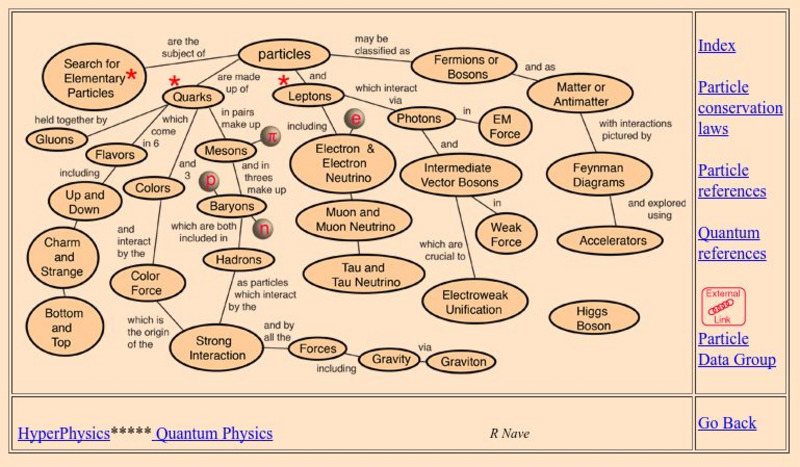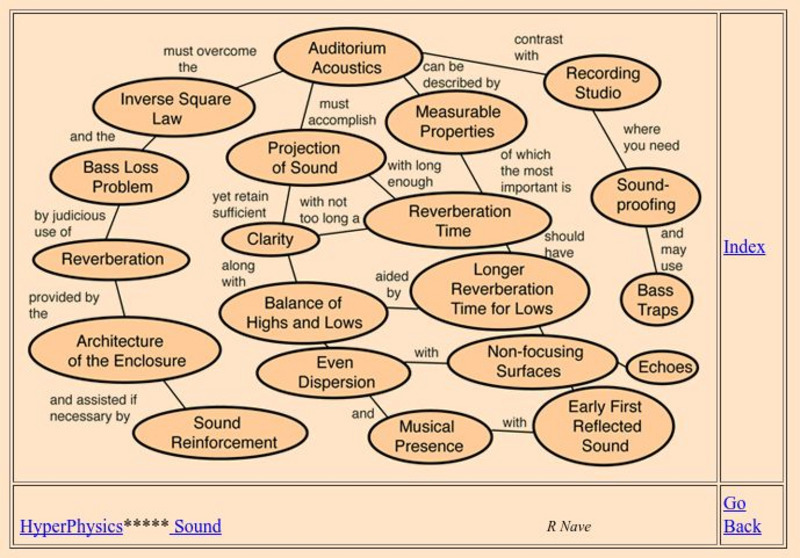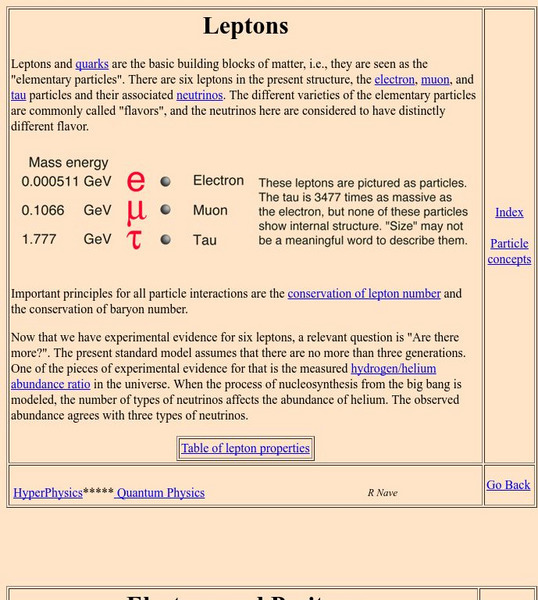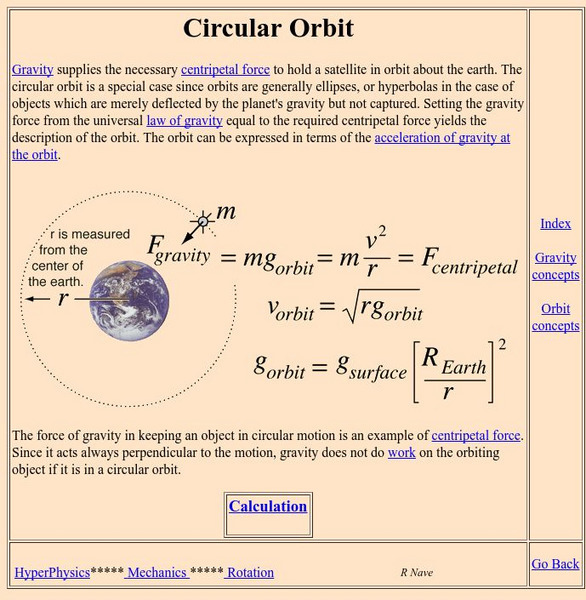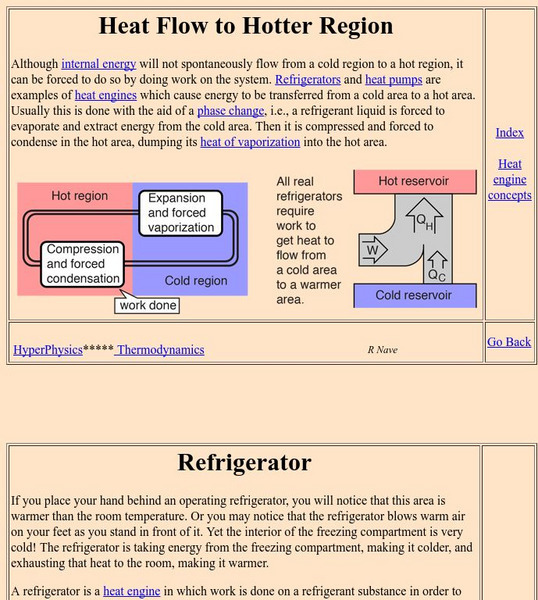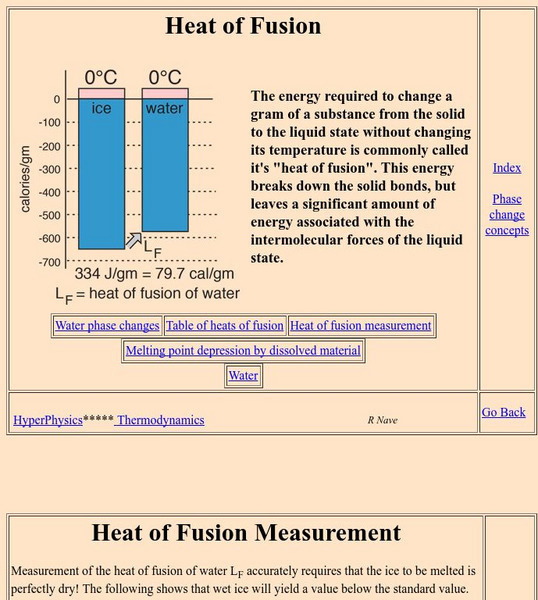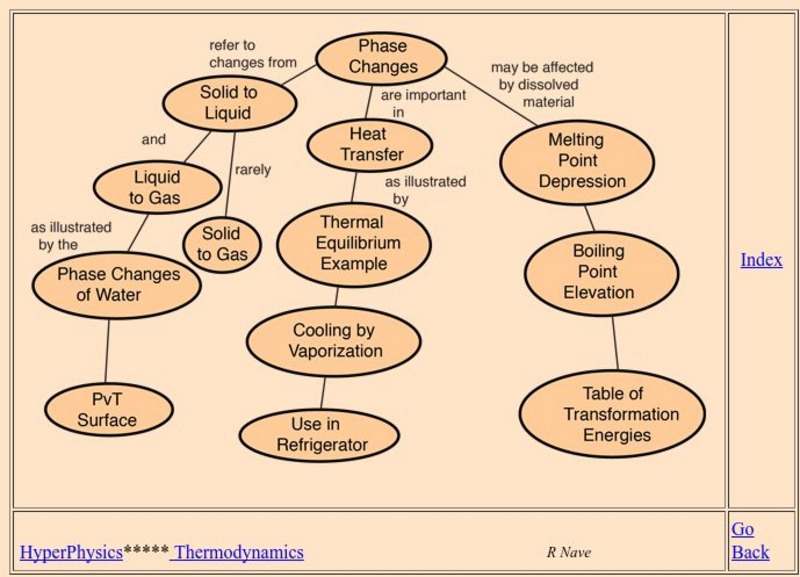Georgia State University
Georgia State University: Hyper Physics: Supernovae
This site from Georgia State Department Astronomy & Physics provides information on the Supernovae. "A supernova is an explosion of a massive supergiant star." Find out much more at this site.
Georgia State University
Georgia State University: Hyper Physics: Conservation of Energy as a Fundamental Principle
See how this principle translates in to fluids and the Bernoulli equation as well as into electric circuits and the voltage law and finally into heat and thermodynamics through the first law of thermodynamics.
Georgia State University
Georgia State University: Hyper Physics: Electricity and Magnetism
HyperPhysics is an exploration environment for concepts in physics by Georgia State University which employs concept maps and other linking strategies to facilitate smooth navigation. This section focuses on electricity and magnetism.
Georgia State University
Georgia State University: Hyper Physics: Particles
This is a very detailed site containing information on several sub-atomic particles including the Hadron.
Georgia State University
Georgia State University: Hyper Physics: The Physics of Loudspeakers
This college-level physics course on acoustics provides a variety of charts and short descriptions of the physics involved in using loudspeakers and audio equipment. Related links.
Georgia State University
Georgia State University: Hyper Physics: Auditorium Acoustics
Home page for a hypertext physics course on auditorium acoustics and acoustical design.
Georgia State University
Georgia State University: Hyper Physics: Leptons
This site has a definition and properties of Leptons, the "Basic building blocks of matter." There are links to table of properties and more information.
Georgia State University
Georgia State University: Hyper Physics: Pitch = Frequency of Sound
Pitch is the ear's response to frequency, and here you can get a better understanding of pitch, its measurement and the perception of pitch.
Georgia State University
Georgia State University: Hyper Physics: Potential Energy
This site from Georgia State University Physics Department defines and explains the concept of potential energy. Using equations and graphics to illustrate the idea, it discusses the many types of potential energy (gravitational,...
Georgia State University
Georgia State University: Hyper Physics: Kinetic Energy
This site from Georgia State University Physics Department defines kinetic energy and compares and contrasts it with other forms of energy. Provides an equation and links to further, more-detailed information.
Georgia State University
Georgia State University: Hyper Physics: Earth Orbits
An equation for the law of universal gravitation is stated. The weight equation (W=m*g) is related to the law. An interactive JavaScript form allows the user to practice determining the force of gravity and the acceleration of gravity...
Georgia State University
Georgia State University: Hyper Physics: Wave Particle Duality
The dualistic nature of light is discussed. The photoelectric effect and the Davisson-Germer experiment are contrasted as empirical evidence supporting each of the two views - particle and wave - of the nature of light. The photoelectric...
Georgia State University
Georgia State University: Hyper Physics: Fundamental Forces
Explains what each of the four fundamental forces is and their interactions with the physical world. The four types are the strong force, the weak force, the electromagnetic force, and the gravitational force.
Georgia State University
Georgia State University: Hyper Physics: Electric Potential Energy
This site from Georgia State University defines electric potential energy and relates it to the concept of electric potential. Discusses the idea of a reference point or a zero potential location.
Georgia State University
Georgia State University: Hyper Physics: Electricity and Magnetism
Georgia State University provides an indexing page for several other pages at the same site which contain information on electricity and magnetism concepts. Pages linked from this page contain many informative graphics, equations,...
Georgia State University
Georgia State University: Hyper Physics: Heat Flow to Hotter Region
Heat flow from a hot region to a cold region is described and explained. Applications of this phenomenon (specifically heat pumps and refrigerators) are discussed. Excellent graphics.
Georgia State University
Georgia State University: Hyper Physics: Heat Engine Concepts: The Otto Cycle
Schematic diagrams illustrating the operation of a four-stroke engine cycle. Interactive buttons allow you to step through the various steps of each engine cycle. Each graphic is accompanied by an excellent explanation.
Georgia State University
Georgia State University: Hyper Physics: Heat Engine Concepts: Carnot Cycle
The Carnot cycle is described, illustrated and explained. The Carnot efficiency equation is given and interactive JavaScript form allows the visitor to investigate the effect of the reservoir temperature and the sink temperature upon the...
Georgia State University
Georgia State University: Hyper Physics: Law Concepts
This site from Georgia State University Department of Physics and Astronomy is an indexing page for the HyperPhysics site. The page links to a variety of other pages which discuss concepts related to entropy and the second law of...
Georgia State University
Georgia State University: Hyper Physics: First Law of Thermodynamics
At this site from Georgia State University the first law of thermodynamics is stated and explained. The meaning of internal energy and enthalpy is discussed. Equations are given and the importance of a system analysis is discussed.
Georgia State University
Georgia State University: Hyper Physics: Zeroth Law of Thermodynamics
The principle of thermal equilibrium is discussed and explained. The zeroth law of thermodynamics is stated. Links to several other pages with related information are provided.
Georgia State University
Georgia State University: Hyper Physics: Heat of Vaporization
A discussion of the vaporization process and the energy changes which accompany the process. Includes an informative graphic and a discussion of how to determine the heat of vaporization.
Georgia State University
Georgia State University: Hyper Physics: Phase Change Concepts
An indexing page for the HyperPhysics site. This page includes links to a variety of pages at the site which contain information related to phase changes. Each individual page consists of informative graphics and clear explanations.
Georgia State University
Georgia State University: Hyper Physics: Heat Engine Cycle
The heat engine cycle is defined and discussed. So pressure-volume diagrams are introduced and their use in depicting the cycles of a heat engine is demonstrated. Informative graphics are accompanied by reason-filled explanations.





